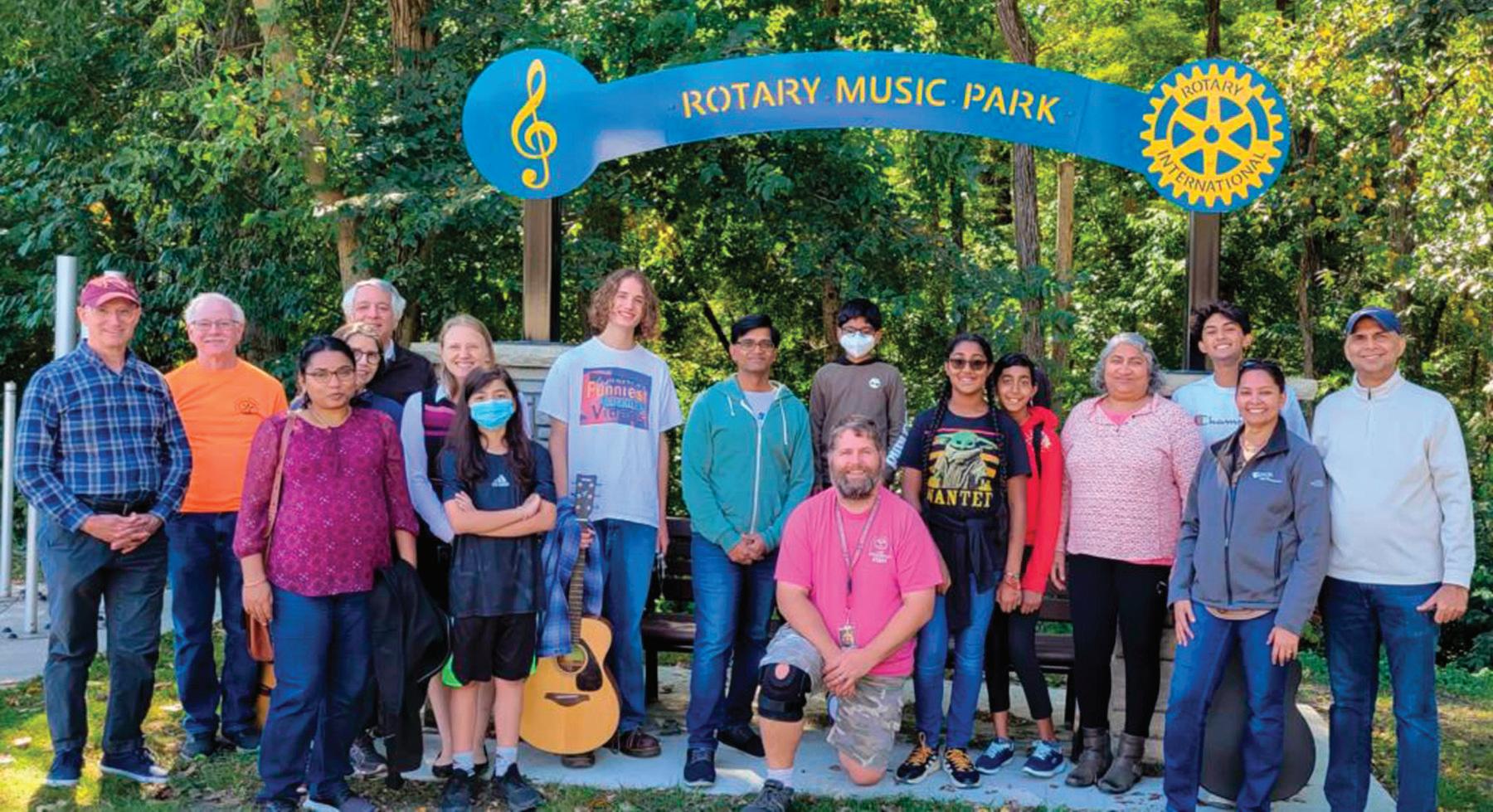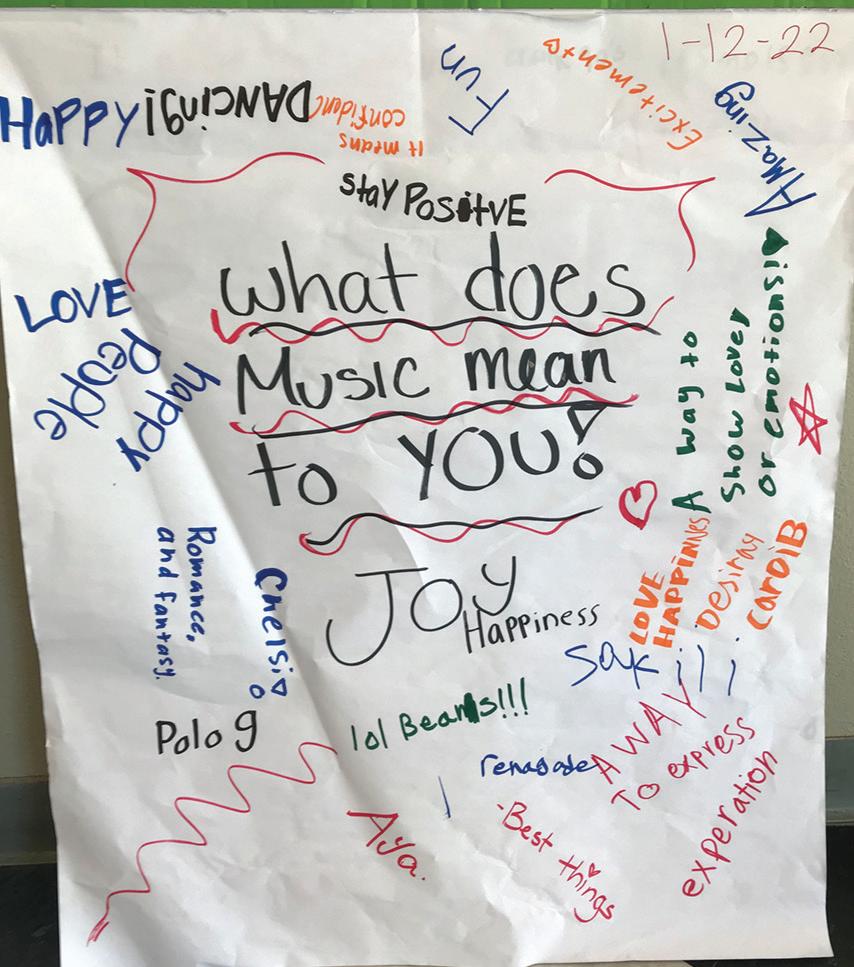
7 minute read
Songs of Healing and Community
By Usha R. Balakrishnan
m y childhood was experienced in New Delhi and Mumbai in a singing household; my mom sang all the time while doing cooking and house chores. She also always sang a quick healing verse to me whenever I fell ill. I did not know its meaning. It was in Sanskrit, dating back from 8 c.e.—one of many traditional songs I would learn as I started formal training in South Indian Classical Carnatic Vocal Music at age 4.
Advertisement
Singing has been with me all my life, and after I left India for America in 1985, I kept up my practice because it was a soothing reminder of my mom. I sang that same healing verse to my own children when they fell ill. But what I never expected was that it would become part of my love of community here in Iowa. It was December 2008: I sang that same healing verse to a retired physician-scientist (endocrinologist Dr. Bob Bar) when he was undergoing surgery. I had met Bob when he became part of an organization I had founded called CARTHA (Collaborative Arts in Research Translation for Human Advancement), a name and acronym coined after the Sanskrit word for “Doer.” Bob and I both shared a dedication to CARTHA ’s mission of engaging individuals as Collaborative Doers for Humanity, and he encouraged me to keep exploring the intersections between singing and healthfulness.
That singing experience in 2008, and all that followed, changed everything for me. Ten years later, I conceived CARTHA ’s Musicality in Parks initiative. My dream was to have a Singing Nook built in a local park to activate the healing aspect of music within us and broadly share that across communities in ways that foster cross-cultural friendships and build supportive community. Music has been known to have an influence on health and healing. Given the extent of pandemicdriven loss and grief burdens, it is imperative for each of us to thoughtfully propose and find new strategies to reduce the level of unresolved grief and to increase coping skills in our communities of many backgrounds. Of much importance to me is instilling joy and healing—especially among younger children, parents, and caregivers—because the pandemic has been especially hard on our younger generations. Singing Nooks are a crucial part of that goal: they offer musically-diverse spaces to foster the development of coping skills, creativity, and healing by connecting people intergenerationally and cross-culturally through music and memories.
My dream to have a Singing Nook in a local park is now a reality at Willow Creek Park in Iowa City, and CARTHA has begun to sponsor field trips to it for children of different ages. The first such gathering was in October 2021. The group was twelve twelve-year-old girls, many of them children of Sudanese and Congolese refugees under the care of Neighborhood Centers of Johnson County. On that chilly Iowa afternoon, I asked each of these girls to respond to the question: “What does music mean to you?” In their responses (pictured on this page), they wrote such connections as Dancing!, Confidence, A Way to Show Love and Emotions, and Stay Positive. The stunning variations in their responses made me recognize the value of additional programming. Since January 2022, we have developed with Tessa Musa and others, twohour “Inspiring Creativity” art workshops with musical/poetic guests, indoors and outdoors at the Singing Nook. For 2023, the partnership goal is to infuse the diversity of musicality throughout all of Neighborhood Centers of Johnson County’s programs!
In another new partnership with John Geyer and Kaite Ryan at Camp Courageous, CARTHA hosted this past fall the first two of many intergenerational musical gatherings for—and including—persons with disabilities at Rotary Music Park in Monticello. Humanities Iowa image: Handwritten responses by children at Neighborhood Centers of Johnson County program to the question: What does music mean to you? Photo by board member Elizabeth Hoover de Galvez was in attendance on October 2 and shared, “at one point, after Usha sang a song in her mother tongue, Tamil, one of the teen campers confidently echoed back a line from the song in the unfamiliar language. It was a beautiful moment of music transcending language and culture and connecting two very different people.”

Every humanitarian project requires the coming together of kindred spirits in a curiouslyorchestrated confluence of time. With Nitin Karandikar leading the CARTHA-Iowa Corridor Sangeet (ICS) community collaborative, we have addressed loneliness through the sharing of childhood musical memories (including through free concert events featuring old/ new Bollywood songs). In addition to being grateful for the dozens of volunteers plus the financial support of private donors and local organizations in the Iowa City area, we are very appreciative of the fact that Humanities Iowa, Executive Director Heather Plucar, and Board members were among our earliest moral and financial supporters to enable the design and launch of so many of these programs that are continuing to expand and grow.
For you as readers of Voices from the Prairie: We hope you join us at future programs! During your next visit to Iowa City, please stop by the Singing Nook at Willow Creek Park.
Perhaps you could do a Singing Tribute to a beloved friend or family member who recently passed away. Perhaps you could sing childhood memories with a friend. And perhaps you will find a new friend singing there, too.
Let’s continue the conversation:
• Those of us at CARTHA would love to hear your thoughts about what music means to you. What is your favorite childhood song, and who taught it to you?
• I encourage each one of you to think about whether a Singing Nook exists in your neighborhood. If so, great: how could you
When a Book Becomes a Story
By Linda Shenk, Heather Plucar, and Karen Mitchell
w e o F ten use the words “book” and “story” interchangeably, but the essence of the humanities suggests how distinguishing a story as something a bit different can be powerful. A book becomes a story when it moves off the page and becomes part of our experience, stirring our thinking, sparking our imagination, possibly even expanding part of who we are. In fact, in indigenous cultures, the notion of “storying” involves far more than the narrative that is told. Storying is connection, interaction, community.
This coming January, the Waterloo Public Library and Humanities Iowa are collaborating to offer a program in which books become stories. The program is called Prime Time Family Reading, and it is part of a whole network of partnerships that began with the Louisiana Endowment for the Humanities and now involves humanities groups across the nation. The Prime Time Family Reading program will be the first of its kind in Iowa.
When families come to the Prime Time at the Waterloo Public Library, they will gather together, share a meal, and then experience a book together such as John Scieszka’s True Story of the Three Little Pigs or Pete Seeger’s adaptation of the South African tale Abiyoyo One of the team members (in this case one of our own Humanities Iowa Board Members, Karen Mitchell) will read the book with all the energetic drama that makes people such captivating readers, and then a conversation begins. Another person (in Waterloo, UNI librarian Amandajean Nolte) will engage the group, particularly the families’ children, by asking them open-ended questions about their experiences and ideas related to the book. Here, the book becomes a story.
The librarian and reader collaborate to devise questions they think will allow that particular community to connect the story to their own lives, allowing the book to inspire ideas and become part of their family’s stories and even the stories of everyone in the room that night. Mitchell, who has a background teaching literature in high school and college, is passionate about this approach: “It is at the heart of how the humanities enrich learning and enrich community. When the group contains adults and children, the discussion can be richly varied and wonderfully surprising. And younger children are included as well. They will be in a group with Gretta Berghammer, an emeritus UNI professor of theatre for youth. Every member of the family has a place in this program!”
Humanities Iowa is especially excited to bring this tested literacy program to the families in our state. The mission of Prime Time is to create the precondition for future learning among economically and educationally vulnerable families—historically underserved or never-served populations—through a humanities-centered family literacy program. Prime Time invites an audience of both children ages 3 to 10 who are experiencing difficulty with reading as well as their parents. The program is designed to overcome initial barriers to reading and encourage families to use the library’s resources or other programs and services a school’s Title I program may promote new types of community partnerships and musical programming around that?
• If there is no Singing Nook, could you talk to your city manager and parks director to incorporate diverse and unique designs of outdoor musical equipment in park spaces?
• We welcome your suggestions, ideas, and feedback that could lead to new and more robust programming and meaningful community exchanges!
Usha R. Balakrishnan Founder & CEO, CARTHA
85 Leamer Court, Iowa City, IA 52246 usha.balakrishnan@gmail.com/ 319-331-8103 provide. As Humanities Iowa’s Executive Director Heather Plucar explains, this combination of support and community has made it “so exciting to be a part of this experience. It is a whole night where a family can come, have dinner, and get to spend time together and with others. It is about families connecting with each other and connecting with the community.”
It is a commitment to the connecting power of story and to equity that inspired Plucar and Waterloo Public Library’s Director David Eckert to begin the partnership. “Any opportunity to foster the love of reading in children is always an avenue worth pursuing,” explains Eckert, “but the program is so much more than that. Its design brings families closer together through book discussions of humanities themes and helps to develop critical thinking skills.” This whole process allows words to lift off the pages and become the stories of who we are. And, as Mitchell explains, “When Humanities Iowa plants the seeds for a project like this, we are making a long-term investment; we bring young people and their families into conversation about how we can collectively grow a better world starting within our own families and communities. What could be a better investment for the future?”
Prime Time Family reading will launch at the Waterloo Public Library on Thursday, January 12th at 5:30pm–7:00pm. For more information, please contact Heather Plucar at heather-plucar@uiowa.edu or 319-335-4150.




